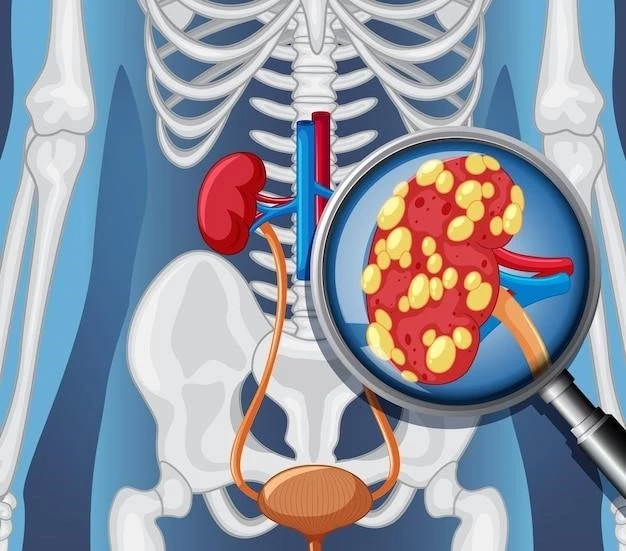Disease ⎼ Dyschondrosteosis Nephritis
Introduction to Dyschondrosteosis Nephritis
Dyschondrosteosis nephritis is a rare disorder that affects bone development and kidney function. This condition is characterized by growth retardation‚ skeletal deformities‚ joint pain‚ and renal impairment. Individuals with this genetic disease face various health issues due to abnormal bone development and kidney inflammation. Understanding the causes‚ symptoms‚ diagnosis‚ and treatment options for dyschondrosteosis nephritis is crucial for providing effective care and management for those affected by this inherited disorder. In this article‚ we explore the complexities of dyschondrosteosis nephritis‚ shedding light on its unique characteristics and the challenges it presents to individuals and healthcare providers.
Understanding Dyschondrosteosis
Dyschondrosteosis‚ also known as Leri-Weill dyschondrosteosis‚ is a rare genetic disorder that primarily affects bone development. It is characterized by short stature‚ skeletal deformities‚ typically involving the forearms and lower legs‚ and joint abnormalities. Individuals with dyschondrosteosis may experience joint pain‚ limited range of motion‚ and other musculoskeletal issues. The condition can lead to growth retardation and a variety of health problems related to bone development. Understanding the underlying mechanisms of dyschondrosteosis is essential for proper diagnosis and management of this bone development disorder.
Nephritis⁚ Definition and Causes
Nephritis‚ a medical condition characterized by inflammation of the kidneys‚ can be caused by various factors such as infections‚ autoimmune disorders‚ and genetic predispositions. In the context of dyschondrosteosis nephritis‚ the kidney inflammation may be a result of the underlying genetic disease affecting both bone development and renal function. Understanding the specific causes of nephritis in individuals with dyschondrosteosis is essential for effective management and treatment of this complex condition. By exploring the definition and underlying causes of nephritis‚ healthcare providers can better address the renal impairment associated with dyschondrosteosis nephritis;
Dyschondrosteosis Nephritis⁚ Overview
Dyschondrosteosis nephritis is a complex medical condition that combines the characteristics of dyschondrosteosis‚ a bone development disorder‚ with nephritis‚ inflammation of the kidneys. This rare genetic disease presents challenges due to its impact on both skeletal development and renal function. Individuals with dyschondrosteosis nephritis experience growth retardation‚ skeletal deformities‚ joint pain‚ and renal impairment‚ necessitating specialized care and treatment approaches. By providing an overview of dyschondrosteosis nephritis‚ healthcare professionals can gain insights into the unique features and interconnected health issues associated with this condition.
Genetic Basis of the Disease
The genetic basis of dyschondrosteosis nephritis lies in inherited genetic mutations that impact both bone development and kidney function. Specific gene alterations contribute to the manifestation of dyschondrosteosis nephritis and play a critical role in the development of this complex disorder. Understanding the genetic underpinnings of the disease is essential for accurate diagnosis‚ genetic counseling‚ and potential future therapeutic interventions aimed at addressing the root causes of dyschondrosteosis nephritis. Research into the genetic components of this condition continues to provide valuable insights into its pathology and potential treatment options.
Symptoms and Health Issues
Individuals with dyschondrosteosis nephritis experience a range of symptoms and health issues associated with both bone development abnormalities and kidney inflammation. Common symptoms include growth retardation‚ skeletal deformities‚ joint pain‚ and renal impairment. The combination of these manifestations can lead to significant challenges in daily life and overall health. Health problems related to dyschondrosteosis nephritis require a comprehensive approach to address both the skeletal deformities and renal complications effectively. By recognizing and managing the diverse symptoms and health issues of this condition‚ healthcare providers can enhance the quality of life for individuals with dyschondrosteosis nephritis.
Diagnosis of Dyschondrosteosis Nephritis
The diagnosis of dyschondrosteosis nephritis involves a thorough evaluation of symptoms‚ medical history‚ and specialized tests to confirm the presence of both bone development disorder and kidney inflammation. Imaging studies such as X-rays‚ bone scans‚ and ultrasounds can help assess skeletal abnormalities‚ while blood and urine tests are used to evaluate kidney function. Genetic testing plays a crucial role in identifying specific gene mutations associated with dyschondrosteosis nephritis. A multidisciplinary approach involving geneticists‚ nephrologists‚ and orthopedic specialists is often necessary to reach a definitive diagnosis and develop a comprehensive treatment plan tailored to the individual’s needs.
Treatment Options Available
Treatment for dyschondrosteosis nephritis typically involves a multidisciplinary approach to address the complex nature of this condition. Management strategies may include orthopedic interventions to correct skeletal deformities‚ medications to manage joint pain and inflammation‚ and renal therapies to support kidney function. Surgical procedures such as limb lengthening surgeries or joint reconstruction may be considered depending on the severity of skeletal abnormalities. Additionally‚ close monitoring of renal function and appropriate interventions to alleviate kidney inflammation are essential components of the treatment plan. Individualized care plans are crucial to optimize outcomes and improve the quality of life for individuals living with dyschondrosteosis nephritis.
Management of Symptoms
Effective management of symptoms in dyschondrosteosis nephritis requires a comprehensive approach aimed at addressing the diverse health issues associated with this complex condition. Symptomatic management may involve pain relief medications to alleviate joint pain‚ physical therapy to improve mobility and function‚ and dietary modifications to support kidney health. Regular monitoring of growth patterns‚ bone development‚ and renal function is essential to track disease progression and adjust treatment strategies accordingly. Psychological support and counseling may also play a role in managing the emotional impact of living with a chronic genetic disease. By actively managing symptoms‚ healthcare providers can enhance the overall well-being and quality of life of individuals affected by dyschondrosteosis nephritis.
Prognosis and Long-Term Outlook
The prognosis for individuals with dyschondrosteosis nephritis varies depending on the severity of symptoms‚ response to treatment‚ and overall disease management. While the condition presents challenges due to its impact on both bone development and kidney function‚ early diagnosis and multidisciplinary care can help improve outcomes and quality of life. Long-term outlooks for individuals with dyschondrosteosis nephritis may involve ongoing monitoring‚ treatment adjustments‚ and lifestyle modifications to address the evolving needs of patients. With proper medical intervention and support‚ individuals with this rare genetic disease can lead fulfilling lives while effectively managing the symptoms and complications associated with dyschondrosteosis nephritis.
Research and Future Perspectives
Ongoing research in the field of dyschondrosteosis nephritis is focused on elucidating the underlying mechanisms of the disease‚ identifying potential therapeutic targets‚ and exploring novel treatment modalities to improve patient outcomes. Advances in genetic technology have enabled deeper insights into the genetic basis of dyschondrosteosis nephritis‚ paving the way for personalized medicine approaches. Future perspectives emphasize the importance of early detection‚ individualized treatment plans‚ and multidisciplinary collaboration to address the complex interplay between bone development abnormalities and kidney inflammation in individuals with this rare genetic disorder. Continued research efforts aim to enhance diagnostic capabilities‚ refine treatment strategies‚ and ultimately enhance the long-term prognosis for individuals living with dyschondrosteosis nephritis.
Support and Resources
Individuals and families affected by dyschondrosteosis nephritis can benefit from access to support groups‚ educational resources‚ and specialized healthcare providers experienced in managing rare genetic disorders. Support organizations dedicated to rare diseases may offer valuable information‚ networking opportunities‚ and emotional support for individuals navigating the challenges of dyschondrosteosis nephritis. Healthcare professionals‚ including genetic counselors‚ nephrologists‚ and orthopedic specialists‚ can provide guidance‚ treatment options‚ and referrals to additional resources to enhance the care and well-being of patients with this complex condition. By connecting with supportive communities and utilizing available resources‚ individuals with dyschondrosteosis nephritis can receive comprehensive care and support tailored to their unique needs.

Conclusion
In conclusion‚ dyschondrosteosis nephritis is a rare and complex genetic disorder that presents challenges associated with bone development abnormalities and kidney inflammation. Individuals affected by this condition may experience a wide range of symptoms‚ including growth retardation‚ skeletal deformities‚ joint pain‚ and renal impairment. The multidisciplinary approach to diagnosis‚ treatment‚ and symptom management is essential in addressing the diverse health issues arising from dyschondrosteosis nephritis. Ongoing research efforts and future perspectives hold promise for advancing our understanding of the disease and improving outcomes for affected individuals. By fostering collaboration among healthcare providers‚ researchers‚ and support organizations‚ we can enhance care‚ support‚ and resources available to individuals and families impacted by dyschondrosteosis nephritis.
